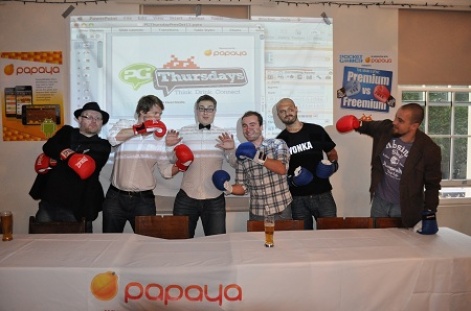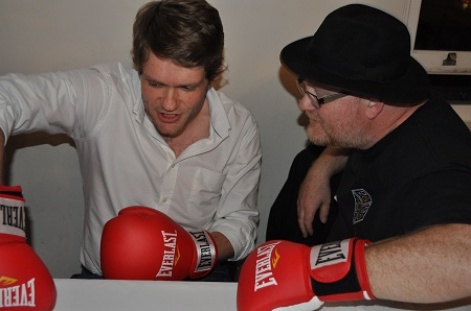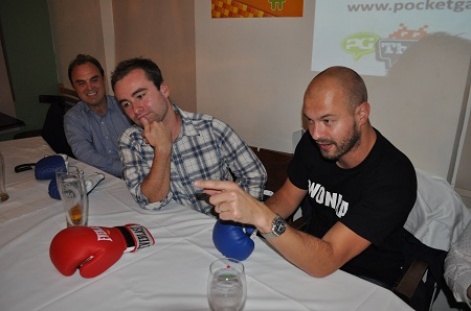Two teams of mobile veterans went head-to-head in an debate over Premium and Freemium pricing models.
The event also saw the boxing match motif taken as far as it could go without fighting breaking out, with both teams issued with own coloured gloves and refereed by the bow-tie sporting Chris James, MD of PocketGamer's owner Steel Media.
On the Premium side (Blue boxing gloves) sat Alex Caccia (Marmalade), Rowan Corben (Bravo Games), and mills (ustwo).
The Freemium team (Red gloves) was represented by Nikolai Shelestov (Alawar), Struan Robertson (NaturalMotion) and Oscar Clark (Papaya Mobile).
Both Corben and Shelestov wore a red and blue boxing glove, to represent they had interests in both sides of the debate, although this was met with shouts of derision from the partisan crowd.
Two people who certainly weren't 'on the fence' were mills and Clark, who were the loudest and most animated of the debaters. Barely a second seemed to pass without one of the two launching an attack on the other's position - often simultaneously.
Round one - Sales
The debate started with a discussion on sales, with the freemium team naturally feeling confident of victory.
Corben was doing his best to scupper the boxing theme by diplomatically revealing that he believed "money could be made on both sides".

Meanwhile, mills side-stepped the sales issue altogether by attacking the quality of freemium games, stating that freemium "seems to be an excuse to release a lot of shit onto the App Store".
"For our studio, it's about making something good that you want to experience and play and enjoy. I don't want to think about the psychological touch points that make our users spend lots of money ... I just want to make a good game," he argued.
Shelestov brought his knowledge of both premium and freemium distribution to the table saying, "On Android, there are still some markets that buy games such as Korea ... but on Android [in general] nobody buys games".
"The time of the premium game is coming to an end," declared Clark, in typically bold fashion.
"There are handful of triple-A titles making money right now. A handful. The question for me is that it's no longer about games, it's about branding. [Gamers] have to know and trust that brand, and most games developers don't have that money or marketing spend."
Robertson's experience of releasing both a premium game with a big brand (NFL Rivals) and freemium game without (My Horse) a week apart onto the App Store seemed to paint an even bleaker picture for premium. "The revenue ... it was about ten times in favour of My Horse," he revealed.
Round 2 - Creativity
Things really started getting heated during round two, with mills opening up with a double-salvo on freemium and Android as a gaming platform to gasps from a section of the crowd.
"I think at the moment [the level of creativity] is piss-poor. I'd be embarrassed if I made a tap-something, zombie-something, farm-something or whatever," he said.
Clark stressed that the freemium required a different way of creative thinking, "[The gamers] are being introduced to a new way of playing", although this was met with a quick retort from Alex, describing traditional freemium titles like FarmVille as "gaming the gamers".

Robertson hit back. "Who cares? FarmVille is not the only kind of freemium game. There's Tiger Woods, Asphalt ...We at Natural Motion do not make a spinner box experience."
Round 3 - Development
Mills opened the round by describing that his latest title Whale Trail had taken six months to develop, with the level of development set to drop post-launch.
The freemium side, on the other hand, was almost exactly the opposite, with Robertson putting the split between pre and post-launch development at "30 percent up front, and 70 percent after launch".
Clark agreed with this assessment, adding that "You have to focus on the service experience, the best possible experience for the user, and that changes your mindset."
But there was disagreement as to just how risky such an approach actually is. Shelestov believed that freemium was "definitely less risky, because you measure the output", while Robertson stressed that less money could end up consigning potentially good titles to the bin too early.

"If you're putting even less money up front just to be able to release something, the metrics may say 'no' and you end up not putting the 70 or 80 percent up there. The scope may be small, but the quality has to be high," he said.
Round 4 - Competition
Competition is, as the popular phrase goes, good. That may be the case for consumers and gamers, but when it comes to developers, too much competition is certainly not a good sign if you want to make money.
Mill's once again opened this round by making a the point that "Everyone seems to be jumping on the [freemium] bandwagon ... hence we went premium".
Clark naturally disagreed, and strongly put forward the case for development on Android over iPhone for freemium developers looking to make money.
"The Apple marketplace is so cosy because they have to have everyone owning a credit card.
"Around the world, what percentage of people own a credit card? The Android Market is much better [in this regard] ... you have to be so much more competitive on Android and better at the game to be successful."
Corben's fears echoed that of Mills, with the marketing cost to enable a freemium game to gain traction dominating his speech.
"The thing that scares me about the freemium models is that they're making millions of dollars, but they're spending even more millions of dollars in making sure they make those millions," he said, referring to marketing and promotion.
This was dismissed by Robertson. "We do what works," he said. "Right now freemium is looking good.
"But it's incredible competitive so you've gotta go in with a strategy. You've got to know you're going to make back the money worldwide."
Round 5 - Quality
With the top charts of our review aggregation service Quality Index showing only three freemium games in the top 50, the question posed to the panel was whether premium games were naturally higher quality than freemium.
For once, mills opened this round with a complement to the other side - more specifically for ngmoco's and Wonderland's GodFinger - saying it "looks brilliant and plays brilliant".
Naturally, this goodwill lasted all of five seconds, with mills, more generally, attacking that "Me too bullshit, where everyone's making a tap game".

Clark wasn't going to let mills get away with that particular swipe, though, and highlighted the case of Duke Nukem Forever on consoles - a "fundamentally rubbish game" - that proves premium doesn't equate quality.
"Freemium games have to be so good so player keep spending money."
And Robertson supported the claim, dismissing calls from the premium side that casual players were being unwittingly "tricked" into playing, saying that those that played Farmville did so because "They enjoy playing FarmVille".
Final Round - The Future
The final fiery round focused on which of the two forms of selling games would come out on top in the future.
Robertson opened his speech with the warning shot to the premium makers. "You'll find there will be an inexorable slide towards freemium across all media. You'll get all kinds of games from a quality of experience point of view making money out of freemium.
"You can go through the design document [of any premium game] and you can start finding places where this is actually a freemium game, and it's still a quality gaming experience. There's no reason as to why you can't design any game you want as a freemium experience," he argued.
Clark, fighting back interruptions from mills, continued to defend the quality aspect of freemium; "The key thing about freemium games is you have to make sure that every player as well as the paying player has a great experience," he reckoned.
"If you don't make sure the free player has a great experience you will not get the critical mass that makes people want to pay."
Mills, however, latched on to comments made by freemium developers in the crowd (including Future Games of London's Ian Harper) for his retort.
"Only three percent pay [for a freemium game]. I think that shows how shite these games are."
Thankfully, the increasingly vitriolic shouting was brought to a halt by Rowan 'two gloves' Corben, who ever diplomatically concluded; "At the end of the day, surely it's not between one or the other - it's both."
Thanks to everyone who attended the event, and the next Pocket Gamer Thursday will be announced soon.



















